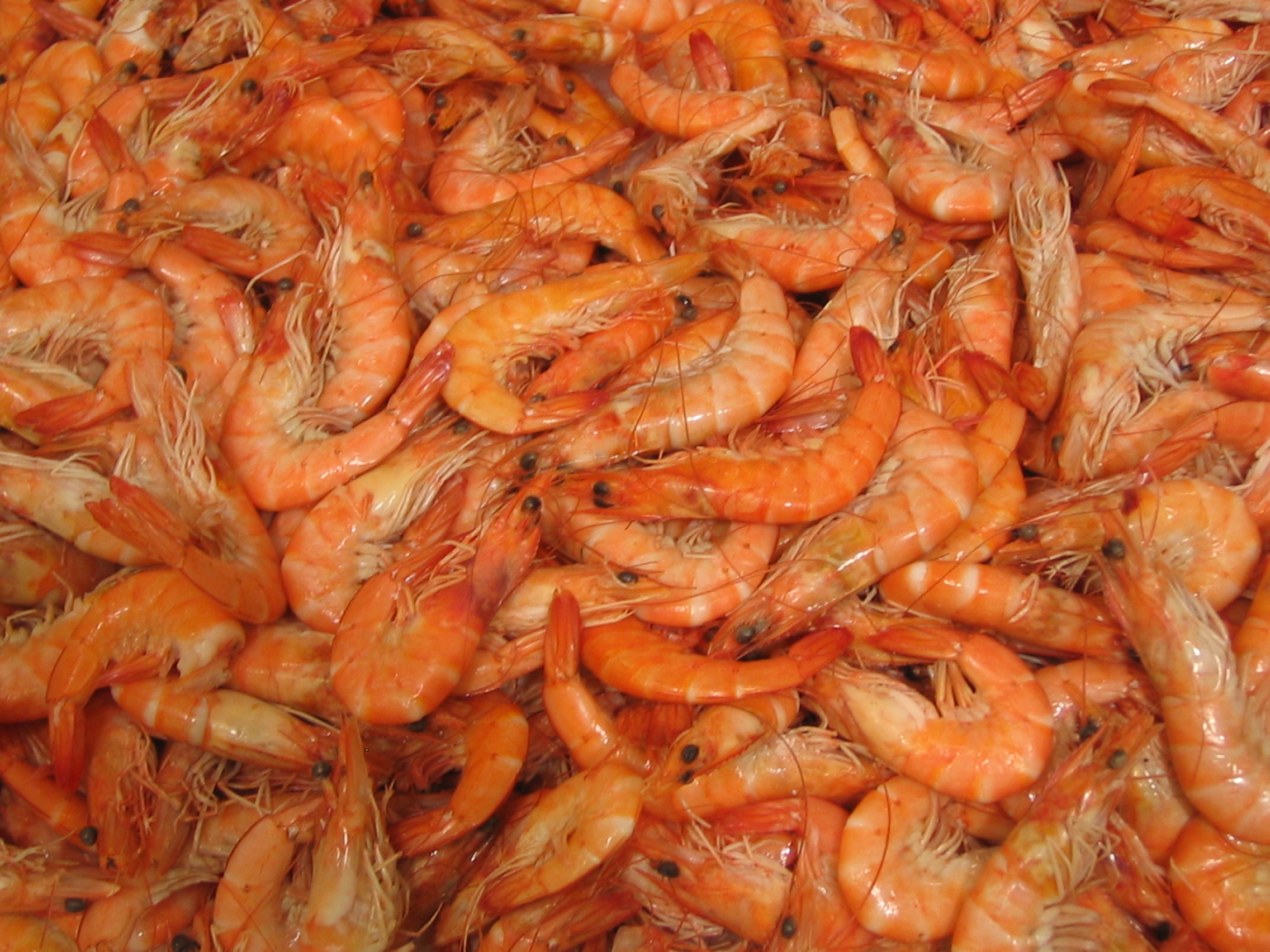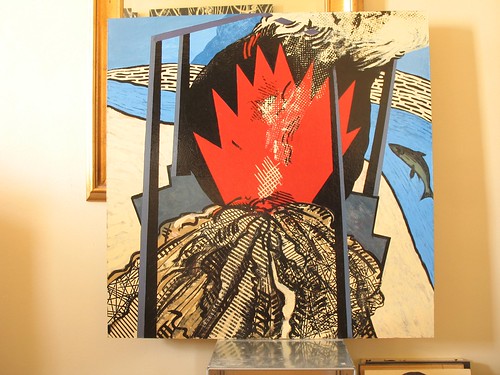|
|
Sunday, April 26th, 2009
I've been enjoying the stories in Zoetrope: All-Story's Latin American fiction issue. Reading them very slowly, moving back and forth between the Spanish and the translation; this is definitely helping get them anchored in my thoughts... Ronaldo Menéndez' story "Insular Menu", about Cubans trying to get by during a period of rationed food, makes me hungry! The story is funny and colorful, the narrator's neighbors raising pigs and crocodiles in their apartments, the zoo director fattening and slaughtering the ostrich, the neighborhood kids fishing from the rooftop for cats; it closes with a dazzling description of the Cuban cuisine that the narrator is missing. The entire long paragraph is well worth your while, I'm just going to quote a bit of it: it closes with a dazzling description of the Cuban cuisine that the narrator is missing. The entire long paragraph is well worth your while, I'm just going to quote a bit of it:
I saw the populous sea that surrounds the islands, and in the sea saw nets and in the nets saw multitudes of shrimp and prawns, saw them populating long familial tables below smiling faces, saw dishes of avocados in slivers and slivers, making a green zebra out of the ceramic, saw oxtail gleaming under chili cream sauce, saw squid and octopi drowning in their ink, saw plantains, mameys, star apples, sapotes, sweetsop, chirimoyas, mangos, saw extra-large lobsters letting their fragrance touch all noses equally...
This is a passage where rhythm is really key. Take a look at the original:
Vi el populoso mar que rodea la isla, y del mar vi redes y de las redes vi muchedumbres de camarones y langostinos, los vi poblando largas mesas familiares bajo rostros risueños, vi fuentes de aguacates en lascas y lascas y lascas, haciendo de la cerámica una cebra verde, vi rabo de toro encendido bajo crema de ajÃ, vi pulpos y calamares ahogados en su tinta, vi plátanos, mameyes, caimitos, zapotes, anones, chirimoyas y mangos, vi langostas de talla extra larga dejando que su olor tocara por igual todas las narices,...
...What to say? I like the English passage, and there does not seem to be any mistranslation (though "in slivers and slivers" is not great), but it does not hold a candle to the Spanish.
 Update: Jim Tucker posts his own attempt at an English translation in comments, and does it very well indeed.
posted morning of April 26th, 2009: 4 responses
➳ More posts about Zoetrope: All-Story
|  |
|
Here is a melody that I've been working on a bit yesterday and today. I'm not sure what kind of a song it is -- at first I thought I might be playing a minuet, and perhaps it is that -- some kind of simple dance. 
While recording this, I finally got my procedure together for setting up and breaking down my recording equipment. Not quite satisfied with the performance, whatever -- this is a work in progress...
 Update: a refinement -- I've changed the B part substantially. have not recorded this yet:

posted morning of April 26th, 2009: Respond
➳ More posts about Fiddling
|  |
Saturday, April 25th, 2009
Martha posts an image of a new painting at her Flickr account today, Loki's House. She explains: Loki was hiding out after the death of Baldur in a house open to all four directions, so he could see if the gods were coming after him. He was making a fishnet when they arrived. He threw the net in the fire and hid in the stream as a fish. But the net didn't burn fast enough.

A longer version of the story is here.Update: Today is a good day for FB friends posting new artwork. Below the fold, a beautiful illustration of James Trotter and various bugs floating on a giant peach, by Jed Alexander.
posted evening of April 25th, 2009: Respond
➳ More posts about Pretty Pictures
|  |
|
I've been having mixed feelings about Book V of LOTR -- I mean the whole trilogy has been fairly warlike, with men who thrive in battle and women who are mostly absent; but the sadistic, drawn-out glamour of the battle for Minas Tirith is freaking me out a bit. Also the timeline of the Riders of Rohan arriving at Minas Tirith and Aragorn arriving leading an army of the dead. (And why no mention is made of their being dead, after he initially hooks up with them in Dunharrow.*) OTOH some of the imagery is just breathtaking, and I like how some of the characters are drawn. Legolas and Gimli are growing on me in a way they have not thus far. Take a look at this passage in Chapter 9, after the two have told Imrahil he is needed at Aragorn's tent:
"That is a fair lord and a great captain of men," said Legolas. "If Gondor has such men still in these days of fading, great must have been its glory in the days of its rising.""And doubtless the good stone-work was wrought in the first building," said Gimli. "It is ever so with the things that Men begin: there is a frost in Spring, or a blight in Summer, and they fail of their promise."
"Yet seldom do they fail of their seed," said Legolas. "And that will lie in the dust and rot to spring up again in times and places unlooked-for. The deeds of Men will outlast us, Gimli." "And yet come to naught in the end but might-have-beens, I guess," said the Dwarf. "To that the Elves do not know the answer," said Legolas.
 * Ah ok, not too many pages later it becomes clear that Aragorn was no longer leading an army of the dead, when he arrived at Minas Tirith. This makes the course of events make much more sense.
posted afternoon of April 25th, 2009: Respond
➳ More posts about The Lord of the Rings
|  |
|
John Holbo's recent posts about "The Squid and the Owl" have been making me think about composition, and specifically about writing in meter. I don't seem to want to write metered poetry right now, but I think it is going to be useful to keep in mind the meter of my sentences as I write prose. Here is a fragment I came up with this morning:
The murky, sticky sediment of thought has not begun to calcify -- not yet, and I believe it can't while I still live. Fossilization takes millions of lifetimes, my Editor is scribbling, is why an archæology metaphor for investigation of your own consciousness cannot work -- and god forbid you should be so presumptuous as to picture actual future archivists tunneling down through your crystalline neural pathways! -- Don't take everything so damn literal I plead, and don't throw my rhythm out like that. Each discarded thought -- each day thousands -- some small rodent's skull, some hunter's artefact, some chitinous exoskeleton cast off and sunk into that dark, pre-conscious stew. As ages of decay and settling pass, this marsh is buried and will turn to rock, and I will no longer have anything to say. -- My current thoughts will crumble and be destroyed utterly (the Editor asserts). Future self, it's on you to dig into these layers of silt and to find these bones and graven images, if there is to be any evidence of me -- so it's on me to dig up and exhume young Jeremy, to see if any of him is worth preserving.
posted morning of April 25th, 2009: Respond
➳ More posts about Poetry
|  |
Friday, April 24th, 2009
Neat-o, I found a new tool for testing stuff out! It is called netcat and it is essentially what I've always wished telnet would be. You can basically open up a socket and listen as the server or attach as a client, and see all the traffic from the other party, and type in the traffic from your side. Be sure to read the (brief) man page as the tutorial pages I've found on the web this morning all omit important information and leave you scratching your head as to what is going wrong. The two things (at first glance) that nc has over telnet: primary point is that you can listen on a port, and thus emulate a server; telnet does not do this at all. Secondary advantage, the whole thing is much cleaner and simpler, and easier to run as a batch job; you don't have to learn escape characters or anything like that. Drawback is that error reporting is pretty minimal; but I can live with that.
posted morning of April 24th, 2009: Respond
➳ More posts about Programming
|  |
Thursday, April 23rd, 2009
I am having a lot of fun with listening to Sylvia coming up with ways that Bilbo and the dwarves could get out of their scrapes -- if they tell Smaug there are fifteen gallons of gold in Hobbiton, then he will fly there and they will be able to get his treasure away (and the hobbits of the Shire will be safe because Smaug "can't smell hobbits"); or Bilbo could loan the ring to Thorin and Thorin would creep down into Smaug's lair and say something that caused the dragon to freak out and run around in circles, until he bumped his head and was out of commission... She's particularly interested in the ring, coming up with ways it could be used to make the entire party invisible. If it's big enough, two of them could put their pinkies together and squeeze it on. (I have myself been wondering how the ring comes to be the right size for Bilbo's halfling fingers.) Bilbo could go to each of their cells in the elf-king's dungeon as the door was being opened to give them food, and toss them the ring, and they could slip out in a flash. She asked a question tonight that plagues me every time Bilbo or Frodo puts on the ring: do the objects he is holding also turn invisible? I don't see any very consistent approach to this question in the texts -- obviously the ring-wearer's clothing becomes invisible, and any paraphernalia in his pocketses; but at one point there was a reference to Frodo swordfighting while wearing the ring, and the sword was said to be visible*. I am not sure what the rule is, or if it's just a matter of the needs of the story-teller at each particular juncture.
 * (And if I'm remembering right, the sword became invisible once more when he slipped it into its sheath -- how does this make sense?)
posted evening of April 23rd, 2009: 2 responses
➳ More posts about The Hobbit
|  |
|
Viridiana will be playing at the Film Forum tomorrow through next Thursday -- fantastic news! I'm definitely coming in to watch it one of those days, if you would like to meet up for a movie, drop me a line and let me know what days are good.
posted morning of April 23rd, 2009: Respond
➳ More posts about Viridiana
|  |
Wednesday, April 22nd, 2009
I've been enjoying having vivid dreams lately. I still do not remember nearly as many or as much of them as I would like, but the experience of dreaming them is very entertaining. It is starting to seem like an obvious choice to re-read Burroughs' My Education: a Book of Dreams, which is a pasting together of thirty years of his dreams, with some conversational writing in between talking about dreams, sometimes noting the circumstances of a dream, never analyzing the content of the dream. I read this quickly when it came out 14 years ago but did not, perhaps, let it sink in enough. Opening it now and looking at some of the dream passages, I notice Burroughs is not making any kind of effort to persuade me of the reality of the dream; instead he is flatly asserting he had this dream, and leaving it up to me to put myself in the dreaming head so that I can experience it. I'm up in a room with a high ceiling and a door at one end. The room is full of light and has a feeling of being open and airy. I float up to the ceiling and bob along to the door and out. There is a porch or balcony over the room and now I am up under the porch about thirty feet off the ground. I move out from under the porch and pick up speed and direction. Very little descriptive language, just a straight narration of the events in the dream. This is seeming at first glance like exactly the right way to present dreams. The style and furnishing of the room, the sensation of floating, the colors in my field of vision are all for me to experience for my own part as I in effect have the dream I'm reading about.
posted evening of April 22nd, 2009: Respond
➳ More posts about My Education
|  |
Tuesday, April 21st, 2009
I dreamt last night, at first, that I had made my way to Santiago and had sought out a famous poet (I cannot remember who; he was also a professor of literature) with the idea that he was going to enlighten me about Chilean poetry. We were sitting in the (oddly very noisy) university library and I was asking him, in better Spanish than I speak but still hardly fluent, to show me which books I should read to learn about poetry in Chile -- as we walked up the staircase I specified, yelling to make myself heard over the din, that I was interested in the latter half of the twentieth century. He brought me to the shelf of books on the topic; there was very little there, maybe 20 dog-eared books, half of them in translation -- it seemed very strange to me. I picked up the heavy Oxford Companion to Chilean Verse and started leafing through it. In the second half of the dream I was debugging a web server I had written to render the work of Nicanor Parra. (Highly specialized, yes.) Sylvia and her friend Giulia came in and wanted to read the poems, also they wanted to play baseball -- I gave them the computer and while swinging their bats, they read three short poems about morning -- the poems were lovely, though they did not sound much like Parra; the only one I remember is: On my birthday I arose
And drank the subtle
Health of morning.
posted morning of April 21st, 2009: Respond
➳ More posts about Dreams
| Previous posts
Archives  | |
|
Drop me a line! or, sign my Guestbook.
•
Check out Ellen's writing at Patch.com.
| |

